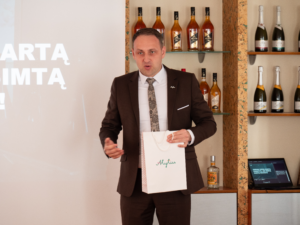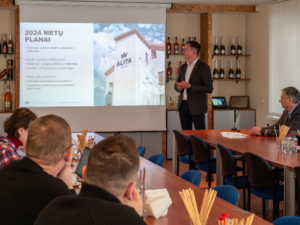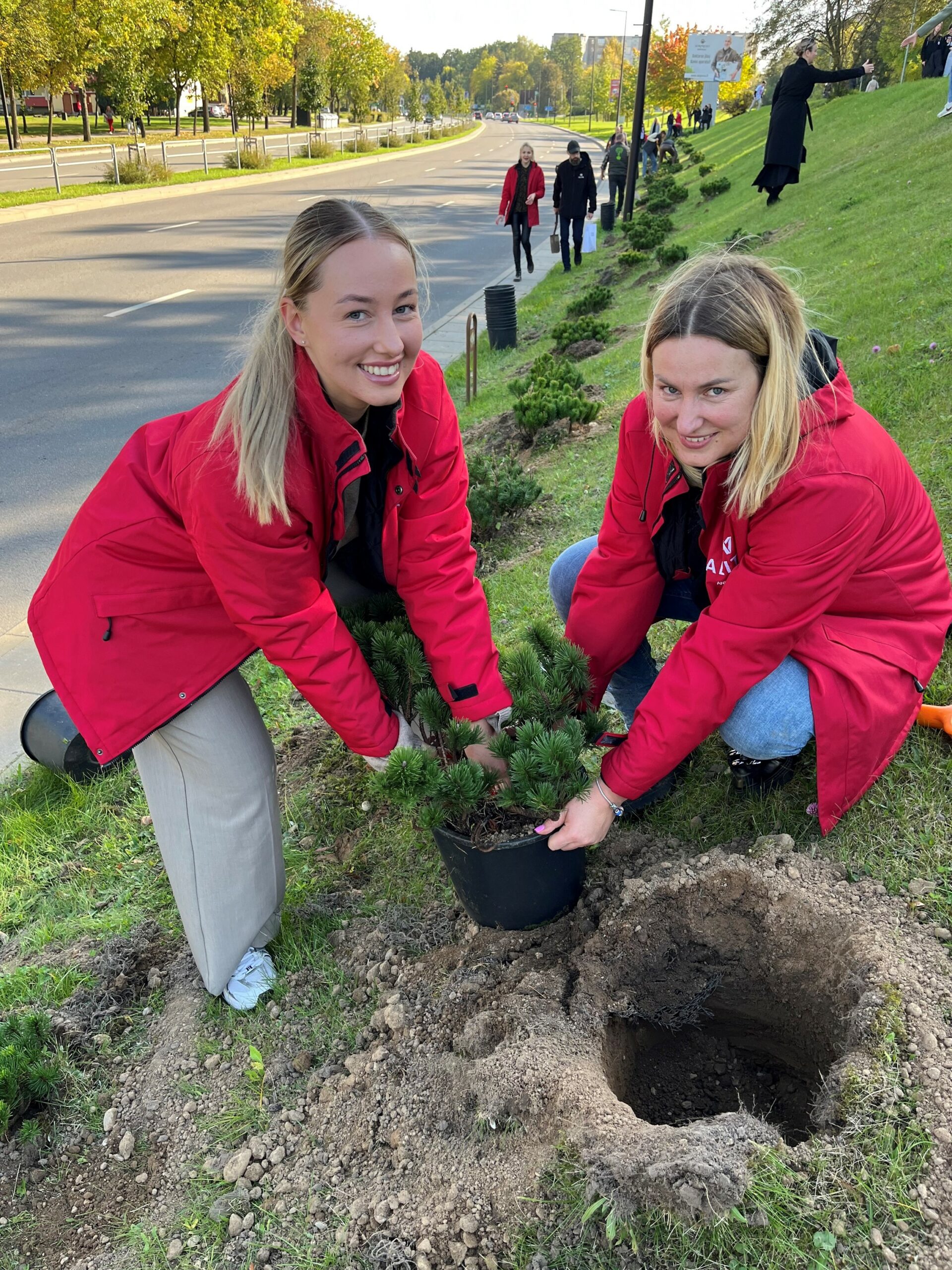
The pride of the Alytus region’s industry – the Alita factory – is entering a new phase. On Tuesday, the newly completed robotization project of the factory was presented to the public and city leaders, marking a new level of progress for Alita. The successful installation of the new transport and automatic palletising system for product packaging meets the standards currently applied by the most advanced beverage companies in the world. The investment in the innovation is around EUR 2 million.
 MV GROUP Production, which manages the factory in Alytus and invests in it consistently, expects Alita to make an even bigger breakthrough in the coming years by representing Lithuania on foreign markets with its products.
MV GROUP Production, which manages the factory in Alytus and invests in it consistently, expects Alita to make an even bigger breakthrough in the coming years by representing Lithuania on foreign markets with its products.
“I am delighted to be here with you today to welcome one of our city’s outstanding companies – Alita. This meeting is symbolic, as if it is the beginning of a new stage in your company’s development. The company’s 2 million investment in a modern system is not only a step forward in your business, but also a preparation for the challenges of the future, when innovation will become not just a catchy phrase, but a necessity and a real deed,” said Nerijus Cesiulis, Mayor of the City of Alytus, during the event to present the realised investment in the Alita factory.
“10 years ago, Alita started a new phase in its history and together they have strongly shaped the MV GROUP Production family. Alytus can be proud of this spirit of industry open to innovation. This is why we are courageous to experiment, learn and grow. “Alita is now 60 years old and moving forward. Today, the people at the factory are working in a way that will keep Alita’s energy and ideas alive for at least another 60 years. This complex robotics project, which has now reached its final stage, is a great testament to the team’s skills, achievements and commitment, as well as an inspiration to strive for even more tomorrow,” said Algirdas Čiburys, Managing Director of MV GROUP Production.

They want to continue to grow and promote Lithuanian products
Consistent long-term investments have resulted in Alita being one of the largest and most modern beverage factories in the region today. The business is purposefully introducing advanced technologies to ensure efficiency and the highest quality of production, to raise the competence of its employees and to improve working conditions. At the same time, the challenges facing the business are being tackled: reducing the impact of staff shortages and increasing competitive advantage.
A record investment in robotics allows for optimised and efficient factory operations. Last year, Alita produced 20 million litres of products in 44 million bottles, with a product basket of 9 product categories. One third of the production was exported. It is estimated that production has increased by 70% since 2014. The innovations introduced allow for further growth in volumes and sales.
The scale of the project took contractors by surprise
The robotics of the seven production lines at the factory was entrusted to the Dutch company Qimarox and Lithuanian engineering solutions company Inna. “Qimarox is a world-renowned company that develops and manufactures components for automated sorting, transport and palletising processes. Inna’s engineers have brought the system components together into a cohesive mechanism.
The state-of-the-art transport and automatic palletising system can palletise more than 100 pallets (up to 5,693 packs) per hour. The project includes the installation of automatic palletising, automatic wrapping, automatic labelling equipment, an IT management system for label content and an automatic conveyor system for pallet flow management.
“We are very pleased that MV GROUP Production has chosen to partner with us on this truly complex project at the Alita factory. This is the first project of this scale and scope in our country. The whole set of equipment forms a single system that automates various factory processes and increases production efficiency. The biggest challenge was the integration of all the equipment. The end result is a smoothly functioning, highly complex system,” said Marijus Žaldarys, CEO of Inna. He acknowledged that the robotics project at Alita was a big challenge for both the engineering team and the equipment manufacturer, Qimarox of the Netherlands.
Making work easier
M. Žaldarys, CEO of Inna, added that this type of equipment and systems is the future of manufacturing coming to Lithuania: “The advanced system and high level of automation installed in this factory should be the choice of every factory to keep its products competitive in the market. These systems ensure and allow all the equipment in the system to work at maximum efficiency, which may not have been possible before due to the human factor. In addition, the installed equipment ensures greater worker safety, ergonomics and added value per person, as people no longer have to perform routine and repetitive tasks, but have been replaced by robots,” said Žaldarys. Now, he said, humans only do the work of the operator, monitoring the work of the equipment, changing parameters, etc. “Given the situation on the labour market today, this is a very well thought-out and sensible step. This is what we would like to congratulate our client on becoming one of the top Lithuanian manufacturing companies that have achieved such a high level of automation,” adds the Inna CEO.
Jelle Deelman, Production Manager at Qimarox, said that the automatic palletising system manufactured by the Dutch company will allow the factory to automate production management. “The system we have developed has been installed on seven production lines. This is a really high number. This is the first project of its kind we have implemented in Lithuania and the first in the Baltic region.”
Employees who have observed the changes in the factory and acquired new skills believe that automated processes in the factory make working conditions much easier. What robots can now easily do, people used to have to do manually. Roboticisation has encouraged colleagues in the factory to acquire new knowledge about modern systems and, at the same time, to upgrade their skills. In addition, technological advances are helping to address the market’s pressing recruitment challenges, which can be caused by a shortage of workers.
Employees develop together
Alita currently employs a total of 169 people. A large team is the value of the organisation, which is why, for many years now, special attention has been paid to the production management system, using the principles of LEAN methodology. Every year, the company invests in team development programmes, fostering its internal culture, and developing initiatives to increase employee engagement.
Alita’s employees are active participants in MV GROUP Academy training programmes. Every year, they deepen and update their knowledge on the values of the organisation, transparency policy, emergency behaviour, etc.
In addition to Alita, the beverage production company MV GROUP Production owns the Stumbras, Anykščių vyno and Gubernija factories. “The manager of MV GROUP Production, A. Čiburys emphasised that the robotization will greatly enrich the company’s experience – it will be beneficial for the industry of Alytus and other cities, because the group is creating a unique synergy of four different Lithuanian factories, there is a common centre of production equipment, laboratories and technologies, and the knowledge is shared by a team full of various competences, knowledge and ideas. This way, respect for the heritage of Lithuanian beverages is maintained, while at the same time centuries-old recipes are nurtured and improved.
MV GROUP Production is a member of MV GROUP, one of the largest groups of companies in the Baltic States, which unites companies involved in the production of alcoholic beverages and other beverages as well as in the wholesale and retail trade and logistics in Lithuania, Latvia, Estonia and Poland.

